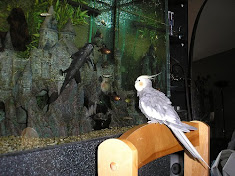 |
| Photo Credit: David Castor |
Finding an Experienced Ferret Veterinarian
There are many veterinarians who will tell you that they treat ferrets, but a veterinarian who specializes in ferrets is best. It's very important to locate a qualified, experienced ferret veterinarian as soon as possible after you bring your ferret home. However, it's best to see if there's one in your area before purchasing your ferret. The veterinarian you find should be able to do a routine checkup and administer vaccines. If your regular veterinarian cannot treat more serious health problems or perform surgeries, ask him or her to recommend a veterinarian who can.
You will also want to locate the nearest 24 hour emergency animal hospital that will treat ferrets. Ferrets often fall ill in the evening, late at night, or on weekends when your veterinarian's office is not open. Given how quickly ferrets can be affected by illness, you will need to get them to a veterinarian as quickly as possible, and it often cannot wait until your regular veterinarian is available.
Routine Checkups
Make an appointment with an experienced ferret veterinarian for a routine checkup at least once a year. This is for the purpose of general preventive care, but also allows your veterinarian to familiarize himself with your ferret so he can more easily identify when your ferret is unhealthy. Annual exams should include weighing your pet; checking eyes, ears, and teeth; listening to the heart and lungs, and examining the ferret for any internal or external lumps or abnormalities. You should also discuss any questions regarding behavior, diet, parasite control, or other issues with your veterinarian at this time.
As the ferret gets older (generally over 3 years of age), you will also want your veterinarian to run annual blood work, including a blood glucose test, to detect any health problems that can't be diagnosed by a physical examination alone. Ferrets over the age of three are at a higher risk of developing insulinoma and other diseases that you want your veterinarian to diagnose as early as possible.
Annual Vaccinations
Ferrets need to be vaccinated yearly against rabies and canine distemper. While there has never been a recorded case of a ferret contracting rabies, the rabies vaccination serves as protection for your ferret in case she bites someone. Imrab-3 is the rabies vaccine of choice for ferrets. Get your ferret vaccinated at three months and then yearly thereafter. By law, all rabies vaccinations must be administered by a veterinarian.
Canine distemper is an airborne disease and is much more common in ferrets than rabies. It is deadly to unvaccinated ferrets. Even if your ferret never leaves the house or never has contact with other animals, you can still bring the virus into the house on your clothes and shoes, so it is important to stay up to date on your ferret's distemper vaccination. The only USDA approved vaccination is Purevax, though many veterinarians also recommend the use of Galaxy-D. Have your ferret vaccinated at 8, 11, and 14 weeks, and then yearly thereafter.
Talk to your veterinarian about giving the rabies and distemper vaccinations at least two weeks apart. Many ferret owners believe that giving the vaccines at the same time may increase the risk of a reaction. Whether or not that is true, it means that it will be more difficult to determine which vaccine was the cause of the reaction. Some ferrets are allergic to components of distemper or rabies vaccines. Allergic ferrets may show a reaction known as anaphylaxis. Within minutes of being vaccinated, the ferret begins vomiting, and may also have diarrhea. Some go limp and may lose consciousness. Ferrets that have this reaction once will not necessarily have another when given a different vaccine, but it is likely that they will react to the same type of vaccine again.
Regardless of whether or not your ferret has ever had a reaction, I recommend that you remain at the veterinary office for 30 - 45 minutes after the vaccine is administered. This will ensure that your ferret gets treatment swiftly if she does have a reaction, and immediate treatment is the only way to reverse the effects.
An allergic ferret may be treated with oral antihistamine an hour or more before he is vaccinated, to prevent an adverse reaction occurring. Your veterinarian can dispense the correct product and dose when a vaccination is scheduled.
When you are at your veterinarian, you should also have your ferret tested for heartworm and placed on a heartworm preventive. Although heartworm in ferrets isn't as common as it is in dogs and cats, it is more deadly because ferrets are a lot smaller in size.
Prevent Hairballs
It is normal for ferrets to shed heavily twice a year - once during the fall before they get their winter coats and once during the spring as they shed their winter coats. During these times, your ferret will be at risk of developing a hairball. As she grooms herself, she will ingest the loose hair. Ferrets cannot throw up hairballs as cats can, so the hair remains in her stomach and intestines, forming blockages. Blockages in ferrets are a life threatening condition, and must be treated aggressively and immediately, often with surgery.
The best way to prevent hairball blockages is to give your ferret a laxative or hairball remedy once a week throughout the year and more frequently during shedding seasons. If you have multiple ferrets, it is possible that only one may be shedding heavily. However, you still want to give the hairball remedy to all of them, as cage mates will groom each other and ingest each other's hair.
Cleaning Ears
Clean your ferret's ears with a ferret ear cleaning solution at least once every two weeks or more often if your ferret builds up earwax quickly. Excessive ferret earwax causes strong odors and puts your ferret at a higher risk of ear infections. Normal earwax is brown or reddish brown in color. Black, crumbly earwax can be a sign your ferret has ear mites, and you should make a veterinary appointment if you suspect your ferret has ear mites.
Clipping Nails
Trim your ferret's nails with ferret-specific trimmers at least once every two weeks or more often as needed. When a ferret's nails grow too long, they start to curl under her feet, making it painful for her to walk. Additionally, long nails can get caught on bedding, rugs or other items, causing them to splinter or even rip off as your ferret struggles to free herself. Some ferrets have even broken their toes in their attempts to free snagged nails.
Environmental Conditions
Temperatures above 75°F can be dangerous to ferrets, and temperatures above 90°F can be fatal. Ferrets cannot pant to cool themselves, so once they are overheated, heatstroke develops rapidly. Ferrets are most comfortable at 65-68°F, and during the summer you will need to provide your ferret with a cool, air conditioned environment.
Here are a few tips to keep your ferret cool:
- Never leave your ferret in a car.
- Keep your ferret's cage out of direct sunlight.
- Always provide cool water for your ferret to drink.
- Freeze water in soda bottles, wrap them in towels, and put them on top of or next to your ferret's cage.
- Move your ferret to the coolest room in your house.
Conclusion
The importance of ferret health and grooming needs shouldn't be underestimated or taken lightly. When you follow a regular grooming and care routine, you will help reduce stress on your ferret and help your ferret become as healthy and comfortable as she can possibly be.
Written by Kristen Onasch
About the Author
Kristen Onasch holds a degree in English from Pennsylvania State University. She has extensive experience in educational publishing for various pet magazines and websites and has owned ferrets for over ten years. She is currently the Senior Ferret Copywriter at Drs. Foster and Smith Pet Supplies, the nation's leading online and catalog pet supplier.
Article Source: http://www.articlesbase.com/pets-articles/proper-ferret-care-what-you-need-to-know-to-keep-your-ferret-healthy-393446.html



0 comments:
Post a Comment